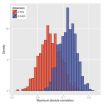(Press-News.org) Are environmental and social problems such as global warming and poverty the result of inadequate governmental regulations or does the burden fall on our failure as consumers to make better consumption choices? According to a new study in the Journal of Consumer Research, responsible consumption shifts the burden for solving global problems from governments to consumers and ultimately benefits corporations more than society.
"When businesses convince politicians to encourage responsible consumption instead of implementing policy changes to solve environmental and social problems, business earns the license to create new markets while all of the pressure to solve the problem at hand falls on the individual consumer. For example, global warming is blamed on consumers unwilling to make greener choices rather than the failure of governments to regulate markets to the benefit of society and the environment," write authors Markus Giesler and Ela Veresiu (both York University).
The authors studied the World Economic Forum in Davos, Switzerland in order to examine the influence of economic elites on the creation of four types of responsible consumers: the bottom-of-the-pyramid consumer, the green consumer, the health-conscious consumer, and the financially literate consumer.
The authors identified a process that shifts responsibility from the state and corporations to the individual consumer. First, economic elites redefine the nature of the problem from political to one of individual consumption (for example, global warming stems from consumers failing to cultivate a sustainable lifestyle). Next, economic elites promote the idea that the only viable solution is for consumers to change their behavior. Third, new markets are created in order to turn this solution into a material reality (eco-friendly light bulbs, hybrid automobiles, energy efficient appliances). Finally, consumers must adopt this new ethical self-understanding.
"The implications of our study are far-reaching and relevant for consumers and policy makers alike. While the responsible consumption myth offers a powerful vision of a better world through identity-based consumption, upon closer inspection, this logic harbors significant personal and societal costs. The responsible consumption myth promotes the idea that governments can never achieve harmony between competing economic and social or environmental goals and that this instead requires a global community of morally enlightened consumers who are empowered to make a difference through the marketplace," the authors conclude.
INFORMATION:
Markus Giesler and Ela Veresiu. "Creating the Responsible Consumer: Moralistic Governance Regimes and Consumer Subjectivity." Journal of Consumer Research: October 2014. For more information, contact Markus Giesler (mgiesler@schulich.yorku.ca) or visit http://ejcr.org/.
An inconvenient truth: Does responsible consumption benefit corporations more than society?
2014-08-26
ELSE PRESS RELEASES FROM THIS DATE:
Getting things done: How does changing the way you think about deadlines help you reach your goals?
2014-08-26
From doing yard work to finishing up the last few classes required for a college degree, consumers struggle to get things done. According to a new study in the Journal of Consumer Research, the way consumers think about deadlines can determine whether or not they start tasks and accomplish their goals.
"Our research shows that the way consumers think about the future influences whether they get started on tasks. In particular, if the deadline for a task is categorized as being similar to the present, they are more likely to initiate the task," write authors Yanping Tu ...
Trash burning worldwide significantly worsens air pollution
2014-08-26
BOULDER -- Unregulated trash burning around the globe is pumping far more pollution into the atmosphere than shown by official records. A new study led by the National Center for Atmospheric Research estimates that more than 40 percent of the world's garbage is burned in such fires, emitting gases and particles that can substantially affect human health and climate change.
The new study provides the first rough estimates, on a country-by-country basis, of pollutants such as particulates, carbon monoxide, and mercury that are emitted by the fires. Such pollutants have ...
Fact or fiction: Which do moviegoers prefer?
2014-08-26
Do you feel sadder watching a documentary about war or a drama about a young person dying of cancer? According to a new study in the Journal of Consumer Research, consumers mistakenly believe they will have stronger emotional reactions when stories are based on true events rather than fiction.
"Consumers may choose to read a tragic fictional story because they assume that knowing it was fictional would make them less sad than reading a less dramatic, but true story," write authors Jane E. J. Ebert (Brandeis University) and Tom Meyvis (New York University). "However, the ...
No purchase required to win? Devoted customers not so sure
2014-08-26
COLUMBUS, Ohio – You've probably seen – or even participated in – promotional contests offered by retailers in which they say "no purchase required to win."
But if you're a loyal customer of that retailer, you don't necessarily believe that, a new study suggests. You figure you must have some secret advantage over other, less-devoted customers.
In fact, the new research finds that loyal customers of a company feel that they are more likely and more deserving than others to win perks from the business – even those that are randomly given out.
"This is driven by people's ...
Are consumers more likely to purchase unintentionally green products?
2014-08-26
A Fortune 500 company is redesigning a popular product using materials that are friendlier to the environment. How will consumers respond to the newly redesigned, "greener" product? According to a new study in the Journal of Consumer Research, consumers are more likely to purchase a product if they think helping the environment is not the intended purpose of a product improvement.
"When a company makes a product that is better for the environment, consumers are actually less likely to purchase it if the environmental benefit is perceived as intentional rather than the ...
How do former churchgoers build a new moral identity?
2014-08-26
As their moral perspectives change, disillusioned churchgoers find it increasingly difficult to remain associated with their church, yet many also find it difficult to leave. According to a new study in the Journal of Consumer Research, former churchgoers experience deep identity crises as their most important relationships and beliefs are put at risk.
"Our research examines currently unsatisfied and former members of the Mormon Church, exploring the experiences of people who have lost their faith in the institution that structured both their morality and their day-to-day ...
ZigBee in the Sky
2014-08-26
26 August 2014 - A team of engineers from Singapore has successfully piloted the world's first ZigBee wireless sensor network (WSN) for satellite communications.
With the weight of payloads being a major constraint in satellite design, constructing a lightweight, low power-consuming, wireless communication system to do away with cabling inside the satellite has always been a challenge for system designers.
The engineering team at the Satellite Research Centre of Nanyang Technological University in Singapore launched VELOX-I, which consists of a nanosatellite weighing ...
Key to speed? Elite sprinters are unlike other athletes -- deliver forceful punch to ground
2014-08-26
VIDEO:
The contemporary view of running mechanics has been heavily influenced by the simple spring-mass model, a theory first formulated in the late 1980s. The spring-mass model assumes the legs work...
Click here for more information.
The world's fastest sprinters have unique gait features that account for their ability to achieve fast speeds, according to two new studies from Southern Methodist University, Dallas.
The new findings indicate that the secret to elite sprinting ...
Crohn's disease gene discovery points towards new treatments
2014-08-26
Genetic changes that occur in patients with the bowel condition Crohn's disease could hold clues to fighting the illness.
Scientists have identified chemical changes in the DNA of patients with Crohn's disease that could help to screen people for the disease.
These changes can be detected in blood samples, opening the door to a simple test for Crohn's disease.
The findings also offer clues to how the condition develops and reveal possible targets for new treatments.
Several genes have been linked to Crohn's disease but not everybody who inherits these genes will ...
Bombarded by explosive waves of information, scientists review new ways to process and analyze Big Data
2014-08-26
Big Data presents scientists with unfolding opportunities, including, for instance, the possibility of discovering heterogeneous characteristics in the population leading to the development of personalized treatments and highly individualized services. But ever-expanding data sets introduce new challenges in terms of statistical analysis, bias sampling, computational costs, noise accumulation, spurious correlations, and measurement errors.
The era of Big Data – marked by a Big Bang-like explosion of information about everything from patterns of use of the World Wide ...



